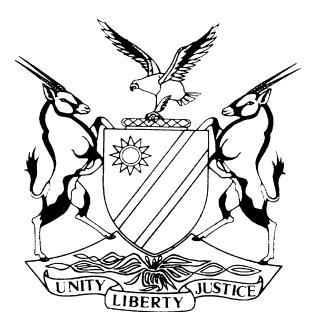5
REPUBLIC OF NAMIBIA

HIGH COURT OF NAMIBIA MAIN DIVISION WINDHOEK
REVIEW JUDGMENT
Case Title: The State v Jakop Seun Hendrickse | Case No: CR 141/2022 |
High Court MD Review No: 1883/2022 | Division of Court: Main Division |
Heard before: January J et Claasen J | Delivered on: 9 December 2022 |
Neutral citation: S v Hendrickse (CR 141/2022) [2022] NAHCMD 676 (9 December 2022) | |
The order:
| |
Reasons for order: | |
CLAASEN J (concurring JANUARY J)
[1] This matter hails from the district court of Keetmanshoop and was referred to this court by way of automatic review in terms of s. 302(1) of the Criminal Procedure Act, Act 51 of 1977 (CPA). [2] The accused was charged with one count of possession of dependence producing substance, thereby contravening s 2(b) of Act 41 of 1971, as amended. He pleaded guilty and was convicted in terms of s 112(1)(b) of the Criminal Procedure Act (the CPA). He was subsequently sentenced to a fine of N$5000 or 18 months imprisonment. The 10 tablets containing methaqualone and 3 packs of cannabis skunk weighing 169g and valued at N$9650 found in his possession were forfeited to the State. [3] Upon receipt of the review record, I directed the following query to the magistrate: ‘Could the court have been satisfied that the accused indeed knew it was cannabis based on his response and in light of the fact that there was no laboratory analysis presented during the proceedings to substantiate this fact?’ [4] In essence, the magistrate responded that she was satisfied that the accused knew what the drugs were and as such, laboratory results were not needed. The magistrate was adamant that the accused admitted all the allegations in the charge and was rightly convicted. This court respectfully, does not agree. [5] The relevant s.112(1)(b) questioning as borne by the record is reflected below: ‘Court: The charge alleges that the cannabis in question was 3 packs of cannabis skunk weighing 169 grams and valued at N$9650, do you dispute this? Accused: I agree. Court: Why do you say this was cannabis? Accused: Its cannabis. Court: How do you know that? Accused: Its skunk; I don’t smoke it and according to the people that smoke it, it is skunk. Court: What did the substance look like? Accused: It was green in colour and has leaves with grey seeds.’ [My Emphasis] [6] This court has dealt with numerous authority in respect of admissions made by an accused when questioned pursuant to s 112(1)(b) of a fact which is palpably outside his personal knowledge.1 The court in S v Maniping; S v Thwala 1994 NR 69 summarized guidelines to assist where an accused pleads guilty and notably held as follows: ‘(d) where the charge is one of dealing in or possessing a prohibited drug the state should be in a position to produce an analyst’s certificate and the accused should be given the opportunity of examining such certificate; (e) where the charge is one of dealing in or possession of dagga the state should be in a position to prove by any acceptable means that the substances in question is dagga…’ [7] The above guidelines, were emphasised in S v Omar (CR 50/2020) [2020] NAHCMD 297 (17 July 2020) where the position was summarised as follows: ‘…When an accused is charged with a drug offence under the Act involving a prohibited substance which can only be proven by scientific evidence or by acceptable means, such evidence must be disclosed to the accused and placed on record for the court to judiciously satisfy itself that the substance so possessed or dealt in, is indeed a prohibited substance in the Act.’ [8] In the instant matter, the court a quo merely relied on the accused person’s contention that it was skunk ‘according to the people that smoke it’, because upon his own admission, the accused does not smoke it. It is unfathomable that the magistrate could have been satisfied with that description. The accused made an admission of a fact that is beyond his personal experience and merely relied on other people’s knowledge thereof. His description of what the substance looked like thereafter did nothing to salvage the situation as this court cannot discern whether it was based on his own experience with the substance or on other people’s rendition thereof. The magistrate further did nothing to resolve the situation by failing to ask clarifying questions. [9] Had an analyst’s certificate been produced by the State and the accused been afforded an opportunity to examine such certificate, the court a quo could have satisfactorily determined the reliability of the admission. Alternatively, as stated in S v Classen (CR 09/2022) [2022] NAHCMD 53 (11 February 2022), ‘…that aspect is to be proven through other evidential means, be it documentary or orally, for example, by a police officer who was familiar with the substance and examined the package and confirms it to be cannabis.’ [10] In the premises, it is our considered view that the magistrate could not have been satisfied that the accused indeed knew it was cannabis. Accordingly, the conviction and sentence stand to be set aside. [11] In the result, the following order is made:
| |
| |
C M CLAASEN JUDGE | H JANUARY JUDGE |
1 S v Maniping; S v Thwala 1994 NR 69; Coetzee v State (CC 2019/00016) [2019] NAHCMD 275 (2 August 2019); S v Omar (CR 50/2020) [2020] NAHCMD 297 (17 July 2020), S v Classen (CR 09/2022) [2022] NAHCMD 53 (11 February 2022).
Cited documents 5
Judgment 3
- S v Classen (CR 9 of 2022) [2022] NAHCMD 53 (11 February 2022)
- S v Coetzee (8) (HC-MD-CRIMINALI-APP-CALL 16 of 2019) [2019] NAHCMD 275 (2 August 2019)
- S v Omar [2020] NAHCMD 297 (17 July 2020)